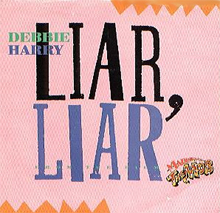History
"Liar, Liar" was written by Jim Donna on a napkin [3] in his parents' house, drummer Dennis Craswell and Donna's sister Joanne helped Donna write it. It was completed in 2 hours. [4] Donna and Craswell took it to the other members of The Castaways and they liked it. The song was recorded on March 2, 1965. The song was shown off to Soma Records founder and President Amos Heilicher, who liked it and signed The Castaways to a contract. [5]
"Liar, Liar" was the first and only hit single by the Castaways. The song peaked at number 12 on the Billboard Hot 100 in 1965. [6] The producer for the track was Timothy D. Kehr. Guitarist Robert Folschow contributed the distinctive falsetto vocal on "Liar, Liar," while Dick Roby did the scream on the song.
The Castaways performed "Liar, Liar" in the 1967 beach party film It's a Bikini World . The song also appears on the 1972 compilation album Nuggets: Original Artyfacts from the First Psychedelic Era, 1965–1968 . It also appeared in the movies Lock, Stock and Two Smoking Barrels and Good Morning, Vietnam.
This page is based on this
Wikipedia article Text is available under the
CC BY-SA 4.0 license; additional terms may apply.
Images, videos and audio are available under their respective licenses.

